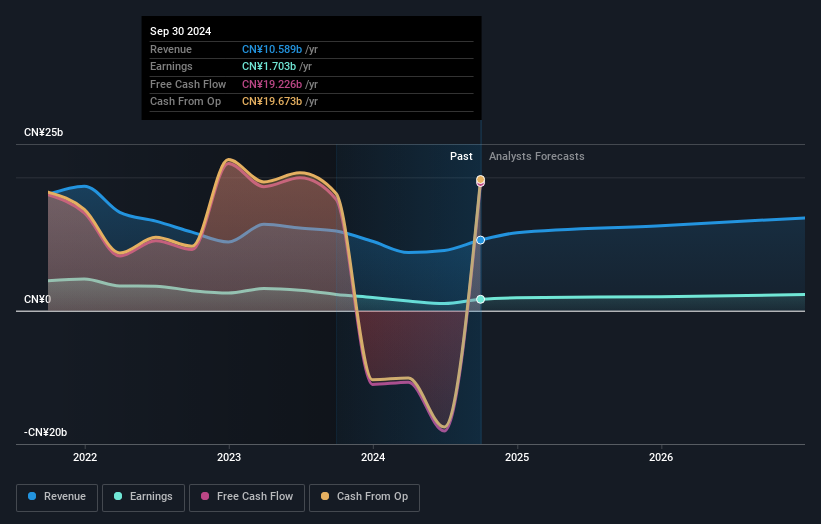- China
- /
- Capital Markets
- /
- SHSE:601377
Industrial Securities Co.,Ltd. (SHSE:601377) stock most popular amongst retail investors who own 51%, while state or government hold 20%

Key Insights
- Industrial SecuritiesLtd's significant retail investors ownership suggests that the key decisions are influenced by shareholders from the larger public
- 49% of the business is held by the top 25 shareholders
- 15% of Industrial SecuritiesLtd is held by Institutions
To get a sense of who is truly in control of Industrial Securities Co.,Ltd. (SHSE:601377), it is important to understand the ownership structure of the business. We can see that retail investors own the lion's share in the company with 51% ownership. In other words, the group stands to gain the most (or lose the most) from their investment into the company.
And state or government on the other hand have a 20% ownership in the company.
Let's delve deeper into each type of owner of Industrial SecuritiesLtd, beginning with the chart below.
View our latest analysis for Industrial SecuritiesLtd

What Does The Institutional Ownership Tell Us About Industrial SecuritiesLtd?
Institutional investors commonly compare their own returns to the returns of a commonly followed index. So they generally do consider buying larger companies that are included in the relevant benchmark index.
We can see that Industrial SecuritiesLtd does have institutional investors; and they hold a good portion of the company's stock. This can indicate that the company has a certain degree of credibility in the investment community. However, it is best to be wary of relying on the supposed validation that comes with institutional investors. They too, get it wrong sometimes. When multiple institutions own a stock, there's always a risk that they are in a 'crowded trade'. When such a trade goes wrong, multiple parties may compete to sell stock fast. This risk is higher in a company without a history of growth. You can see Industrial SecuritiesLtd's historic earnings and revenue below, but keep in mind there's always more to the story.

Hedge funds don't have many shares in Industrial SecuritiesLtd. Looking at our data, we can see that the largest shareholder is Fujian Provincial Department of Finance with 20% of shares outstanding. For context, the second largest shareholder holds about 8.7% of the shares outstanding, followed by an ownership of 3.2% by the third-largest shareholder.
Our studies suggest that the top 25 shareholders collectively control less than half of the company's shares, meaning that the company's shares are widely disseminated and there is no dominant shareholder.
While it makes sense to study institutional ownership data for a company, it also makes sense to study analyst sentiments to know which way the wind is blowing. There are a reasonable number of analysts covering the stock, so it might be useful to find out their aggregate view on the future.
Insider Ownership Of Industrial SecuritiesLtd
While the precise definition of an insider can be subjective, almost everyone considers board members to be insiders. Company management run the business, but the CEO will answer to the board, even if he or she is a member of it.
Most consider insider ownership a positive because it can indicate the board is well aligned with other shareholders. However, on some occasions too much power is concentrated within this group.
We note our data does not show any board members holding shares, personally. Given we are not picking up on insider ownership, we may have missing data. Therefore, it would be interesting to assess the CEO compensation and tenure, here.
General Public Ownership
The general public, who are usually individual investors, hold a substantial 51% stake in Industrial SecuritiesLtd, suggesting it is a fairly popular stock. This level of ownership gives investors from the wider public some power to sway key policy decisions such as board composition, executive compensation, and the dividend payout ratio.
Private Company Ownership
It seems that Private Companies own 14%, of the Industrial SecuritiesLtd stock. Private companies may be related parties. Sometimes insiders have an interest in a public company through a holding in a private company, rather than in their own capacity as an individual. While it's hard to draw any broad stroke conclusions, it is worth noting as an area for further research.
Next Steps:
I find it very interesting to look at who exactly owns a company. But to truly gain insight, we need to consider other information, too. For example, we've discovered 1 warning sign for Industrial SecuritiesLtd that you should be aware of before investing here.
If you are like me, you may want to think about whether this company will grow or shrink. Luckily, you can check this free report showing analyst forecasts for its future.
NB: Figures in this article are calculated using data from the last twelve months, which refer to the 12-month period ending on the last date of the month the financial statement is dated. This may not be consistent with full year annual report figures.
New: AI Stock Screener & Alerts
Our new AI Stock Screener scans the market every day to uncover opportunities.
• Dividend Powerhouses (3%+ Yield)
• Undervalued Small Caps with Insider Buying
• High growth Tech and AI Companies
Or build your own from over 50 metrics.
Have feedback on this article? Concerned about the content? Get in touch with us directly. Alternatively, email editorial-team (at) simplywallst.com.
This article by Simply Wall St is general in nature. We provide commentary based on historical data and analyst forecasts only using an unbiased methodology and our articles are not intended to be financial advice. It does not constitute a recommendation to buy or sell any stock, and does not take account of your objectives, or your financial situation. We aim to bring you long-term focused analysis driven by fundamental data. Note that our analysis may not factor in the latest price-sensitive company announcements or qualitative material. Simply Wall St has no position in any stocks mentioned.
About SHSE:601377
Industrial SecuritiesLtd
Operates as a securities company in China and internationally.
Adequate balance sheet average dividend payer.


